CLAUDIA LUDLOW PUTS GUESTS, EMPLOYEES FIRST AT GLORIETTA BAY INN



CLAUDIA LUDLOW PUTS GUESTS, EMPLOYEES FIRST AT GLORIETTA BAY INN


Even though it’s the shortest month of the year, February is packed with celebrations. We start the month with Groundhog Day on the second, followed by Valentine’s Day on the 14th and Presidents Day on the 20th. February is also Black History Month, Humpback Whale Awareness Month and National Cancer Awareness Month.
Did you know that Valentine’s Day has been celebrated since the Middle Ages with people exchanging cards? Shakespeare and Chaucer helped popularize it as a day of love. But the holiday really took off when Hallmark started mass-producing valentine cards in 1913.


Our February issue is packed with a lot of love. We profile Claudia Ludlow, whose love for making people happy helps make her a successful general manager of the Glorietta Bay Inn. We also write about Kitt and Richard Williams, whose love for running brought them together and keeps them going.
What’s it like to spend 24 hours on an aircraft carrier? We’ve got that story, too. Side note from the editor: After being on board to watch operations up close, I came away with a new level of appreciation for the chain of command and teamwork it takes to keep a giant carrier running smoothly and efficiently. Thanks to the whole crew of the USS Abraham Lincoln for a most memorable visit.
We would also love to hear from you. How are we doing? Send your comments to editor@coronado365.com.
Cheers!
Leslie & MartinaFEBRUARY 2023
COVER STORY
4
4 WELCOMING STYLE
Claudia Ludlow puts hospitality first as general manager of the Glorietta Bay Inn.
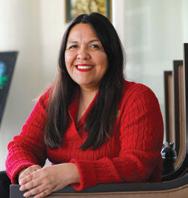
FEATURES
16 AWARD-WINNING COUPLE
Long-distance runners Kitt and Richard Williams are still at the top of their sport.
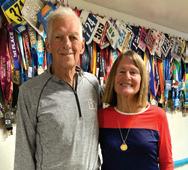
16 22
ON THE COVER
22 TOUR OF DUTY
A 24-hour stint on an aircraft carrier offers a glimpse of life on board a large Navy ship.

34 SNAPSHOT IN TIME
Lou Bigelow chose an independent path, running a successful photo studio in the early 1900s
DEPARTMENTS
12 DID YOU KNOW?
Orville Redenbacher, the popcorn king.
32 LOOKING BACK
This month in Coronado history.
40 BEACHCOMBER
Wentletraps.
42 RESTAURANT LIST
A complete guide to local dining.
44 FROM THE GROUND UP
A guide to jump-start a bountiful spring garden.
PUBLISHER
Now and Then Publishing LLC
EDITOR
Leslie Crawford
CREATIVE DIRECTOR/MANAGING EDITOR
Martina Schimitschek
COPY EDITOR
Rose Wojnar
CONTRIBUTORS
Nicole Sours Larson, Nancee Lewis, Nancy Nygard, @coronadobeachcomber
Visit us online at Coronado365.com
CORONADO’S AWARD-WINNING MAGAZINE
FEBRUARY 2023 » VOLUME 2 » ISSUE 2
CONTACT

editor@coronado365.com or (619) 435-0334
ADVERTISING
To advertise, contact Leslie Crawford at leslie@Coronado365.com or advertising@Coronado365.com

CORONADO 365 is a division of Now and Then Publishing LLC, 830 Orange Ave., Suite B, Coronado, CA 92118
Copyright ©2023 Now and Then Publishing LLC
All rights reserved. Reproduction of any material in whole or in part without written permission is prohibited.
Coronado 365 is available nationally. For subscriptions go to Coronado365.com or email subscriptions@coronado365.com
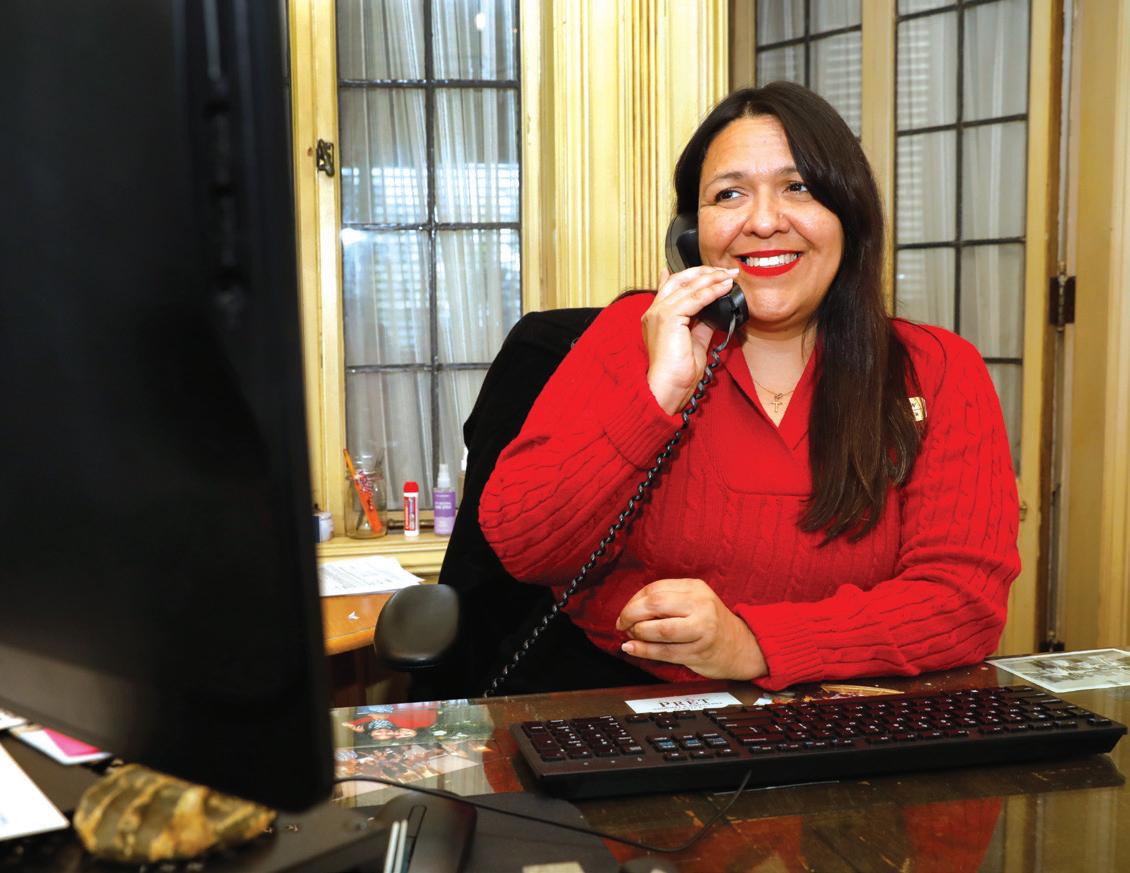
Claudia Ludlow’s secret to success as general manager of the Glorietta Bay Inn lies in her ability to make people happy. That applies to both her guests and her fellow employees.
She and her team have brought a host of awards and honors to the historical boutique hotel, which was originally built by sugar baron and San Diego developer John D. Spreckels in 1908 as his personal residence.

These awards include General Manager of the Year from the California Hotel & Lodging Association (2012), as well as Best Guest Relations statewide from the California Hotel & Lodging Association (2013) and nationwide from the American Hotel & Lodging Association (2014).
Complementing these accolades, Ludlow’s peers chose her as chair of the hospitality marketing group Discover Coronado in 2014 as well as chair of the Coronado Chamber of Commerce during the tough pandemic year of 2020. And last year, the Coronado City Council proclaimed June 21, 2021, as Claudia Ludlow Day.
Yet, the ever-modest Ludlow, who joined the hotel in 2002 and became general manager in 2010, consistently shares any praise with others.
“The executive team was amazing. They did so much work during the pandemic to help the businesses,” she said. “I see myself solving problems. It’s something that comes very naturally. Both your employees and your guests appreci-
ate it — along with my open door.”
Ludlow, now 49, is not your traditional hotel general manager. She didn’t attend hotel school, nor even college, but values education highly and has completed many professional development certificate programs.
Todd Little, executive director of Discover Coronado, which markets meetings and conventions for Coronado’s four major resort hotels, has worked with her since 2010 as a leader on his board of directors. He considers Ludlow — the current treasurer of Discover Coronado — one of his most valued volunteers.
“Claudia’s paid her dues. She’s worked her way to the top. She recognizes what things need to be done and is always the first to volunteer. She’s a tremendous asset and one of the pillars of our organization,” he said. “She’s also funny, warm, whip smart and caring — and much beloved. Nobody is going to work harder than Claudia. What a privilege to work with her,” Little exclaimed.
Ludlow’s success as general manager of a prestigious boutique hotel was not a given. Born in Tijuana, the youngest of three children, she describes herself as “Blaxican.”
Her father, George Ludlow, was the son of James and Tallie Ludlow, early African
American Coronado residents who arrived from Washington, D.C., about 1918 and operated the Satisfied Dry Cleaners on Orange Avenue.
Ludlow’s parents separated when she was about 6. Her Mexican-born mother, Vicenta Ludlow, routinely juggled two or three jobs, often in hospitality roles, while raising her children. She is now retired and lives with Ludlow in Imperial Beach. Ludlow’s father died in 2005 at the age of 91.
Ludlow grew up with her mother, bouncing between Coronado and the Barrio Logan area, the first place she experienced discrimination as a minority. Self-described as a “rebellious child” who “tormented her family,” Ludlow got into trouble and involved with drugs in high school. Her mother, her rock to this day, stood by her, insisting on two stints in rehab. Toward the end of her second round, she ran away, objecting to the “things they were making up about me.”
“I told my mom, ‘If you let me come home, I’ll go to school and go to work,’ ” she said.
Ludlow, determined to take responsibility for her own life, cleaned up her act and graduated from Coronado High School, although a year late, in 1992.
“I knew I couldn’t get into college, but I
“I enjoy making people comfortable, giving people a smile.”
CLAUDIA LUDLOW



took computer and other business-related classes,” Ludlow said.
These courses led her toward a lifelong love of reading and learning.
Ludlow quickly found a job babysitting for a family friend who’d known her since early childhood. The friend, who worked at the Hotel del Coronado, thought she’d be a natural to work in hospitality and introduced her to the front desk manager at The Del.
“I went to him and asked for the opportunity to work,” she explained.
She never looked back.
Ludlow, then in her late teens, joined the Hotel Del as a bell desk receptionist. She loved the work and soon was
promoted to the audiovisual department, helping to stage meetings and shows. She worked at The Del four years before moving on to the U.S. Grant Hotel in San Diego. There, she spent three years as a sales manager specializing in corporate and group conference sales, followed by a year as sales manager at the Pala Mesa Resort in Fallbrook.
When she joined the Glorietta Bay Inn as a human resources assistant in 2002, she took a step down professionally. But the long commute to Fallbrook wreaked havoc on her family life and care of her three young children, now ages 14 to 27.

Ann Alpert, the former vice president of Girard Capital, which then owned the Glorietta Bay Inn hired Ludlow, mentored her and now considers her one of her closest friends.
“I knew instantly she had all the personality, drive and skill set. I knew she could do the job. The rest is history. She took a lower-level job as a back-office person and quickly rose to become general manager,” Alpert said. “She’s one of the best managers I’ve ever worked with. She recognizes talent and then gives them the responsibility while providing excellent feedback. You have happy employees; you have happy guests.”
But recent years have been challenging as staffing shortages persist for the inn, which has 11 historical mansion rooms and 89 contemporary rooms and suites.
After furloughing all but a handful of her key staff at the start of the pandemic in March 2020, Ludlow left the inn, her future career in doubt. Coronado’s hospi-
tality industry had all but shut down.
True to character, Ludlow had chosen herself to be furloughed, prioritizing the property’s maintenance, her staff’s jobs and potential guests’ care over her own position.
“I left here not sure if I’d ever come back,” she said. But Kamla Hotels, who bought the property in 2018 and kept her on as general manager, brought her back after 50 days.
Ludlow emphasized the importance of creating a welcoming environment for guests.
“The little touches make a world of difference. I ask staff to find out why guests are here. Sometimes it’s not the happiest of reasons. Then we welcome them in a different way to make them comfortable. I enjoy making people comfortable, giving people a smile,” she said.

If something goes wrong with a guest’s experience, she’ll do everything possible to make things right. On one occasion, the hotel had failed to provide special cupcakes that longtime clients had requested.
“I took some cupcakes and delivered them to the clients in Scottsdale and had breakfast with them. The staff’s hospitality to our guests is everything,” Ludlow explained.
Her employees appreciate the accessibility of her open door and her willingness to pitch in when needed.
“When I go do a room inspection, I take along my own cleaning bag. If anything needs a touch-up, I take care of it. There’s no shame. The staff has seen
me do it all. They see me cleaning toilets — but I still can’t tuck the bed corners properly,” she said, laughing.
Consistent mentoring all the way up the ladder, Ludlow said, has been key to her success.
“The person I work with has to be my mentor. How else will I learn? Everyone I’ve crossed paths with has taught me,” she explained.
She’s now in the position to pass along her knowledge. “My goal is to grow people and get them out of here, send them on to Loews (Coronado Bay Resort) and The Del. When I hear they’re doing well, that warms my heart.”
Ludlow wants her former employees to look back and think she was great to work with and that she treated them like an equal. She carries that attitude into her volunteer work with MANA de San Diego, a nonprofit whose mission is to “empower Latinas through education, leadership development, community service, and advocacy.”
“When I joined MANA, I became part of this great network of prominent Latina women who so inspired me,” Ludlow said.
Rosa Hernández, who met Ludlow through MANA, observed Ludlow’s skill in recognizing and nurturing ability that
others might not see.
“Claudia is a very passionate, deliberate and kind leader. She’s been able to help the community see things through a different lens, as a woman, Latina and Mexican,” Hernández said.
Ludlow’s journey from troubled teen to successful hotel general manager circled back recently to Coronado High School, where she attended her 30th class reunion.

How was she received?
“My friends were so proud of me,” Ludlow reported. ■


Coronado resident Orville Redenbacher once ruled the popcorn industry. Redenbacher, an Indiana-native who was raised on a small corn farm, spent years trying to create the perfect popping corn. Orville Redenbacher Gourmet Popping Corn was introduced in 1971, and within five years, it surpassed all 82 rival brands. His microwavable kernels were the first that didn’t need to be refrigerated. Redenbacher became the public face of his popcorn brand. He said his proudest accomplishment was increasing the U.S. consumption of popcorn. “We’ve changed the whole marketing concept of popcorn,” said Redenbacher in a 1993 Eagle & Journal interview at his Coronado Shores condominium office.
Redenbacher lived at the Shores for 18 years until his death in 1995. “I’ve traveled through all 50 states and 97 countries, and this is the best place that I’ve been to,” he said of Coronado. Wearing a big smile and his trademark bow tie, Redenbacher could be seen driving around town in his Cadillac convertible with the license plate ‘ORVILLE.’ He often handed out patches to children that said: “I met Orville Redenbacher, the Popcorn King.” ■

 LESLIE CRAWFORD
The utility box at the corner of 8th Street and Orange Avenue features an illustration of Orville Redenbacher in his trademark bow tie.
LESLIE CRAWFORD
The utility box at the corner of 8th Street and Orange Avenue features an illustration of Orville Redenbacher in his trademark bow tie.




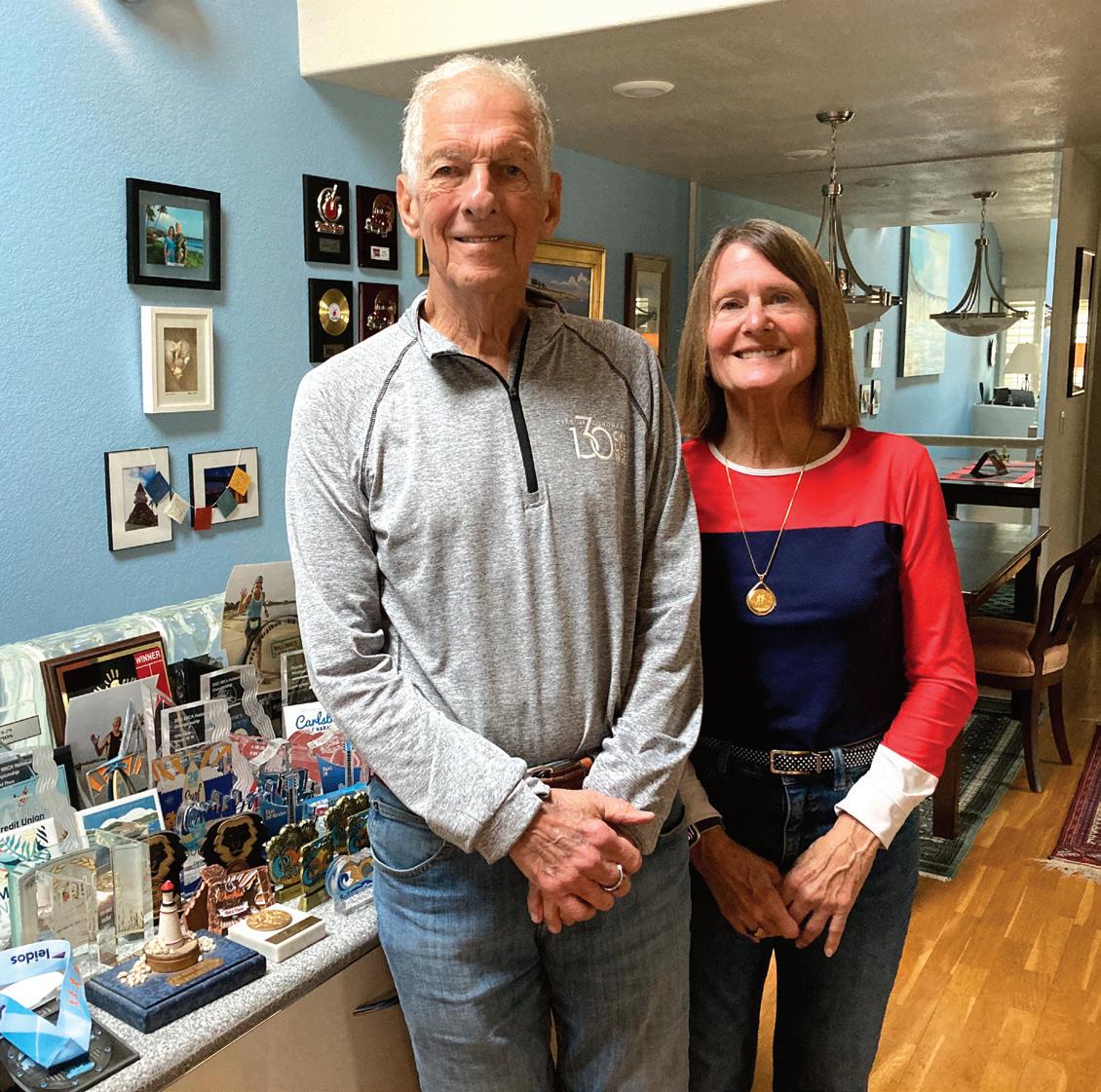
On most mornings, you can find Kitt and Richard Williams out early, running along the paths and streets of Coronado.
The two have built their life together around the sport of running. And while age may have slowed them down a bit, their determination and competitive spirit has not diminished.
Richard, now 87, and Kitt, 75, are filling in their 2023 race schedule. They plan on participating in runs — from 5Ks to half-marathons — across the country nearly every weekend this year.

No matter the length, a medal is pretty much guaranteed for both. The number of competitors in their age groups is dwindling, and their consistent training takes them to the top of the bunch. And they have the awards to prove it. The shelves and walls of their Coronado condo

are filled with trophies, and hundreds of medals hang on hooks in the garage. Most only date back as far as 16 years, when they moved to Imperial Beach, where they lived about five years before relocating to Coronado.

“Competition is what we thrive on,” he said. “We run together when we train, but we never run together in races. Everybody is on their own.” Sometimes Kitt comes in ahead of Richard; other times the results are reversed.
“They are America’s premiere running couple,” said Jim Callaway, a fellow Coronado resident and lifelong runner.
“The two are completely dedicated to the sport. There are not many couples like them. They are always on the platform.”
Kitt and Richard Williams have accumulated hundreds of medals, which are displayed on the garage wall.
The 80-year-old Callaway recently became a rival of Richard in over-80 divisions. In the 2022 Holiday Bowl 5K in San Diego, Callaway came in first and Richard second in their division.
Callaway met the couple 15 years ago at the Holiday Bowl run, and they have been friends ever since.
Kitt said the social aspect of running is a big incentive to keep going. The two join a group of runners every Wednesday in Balboa Park. Like their Coronado training runs, the weekly Balboa Park runs range from 4 to 6 miles and are capped off with a beer.
“It’s a tight community of very good sports,” Kitt said.
Running brought the two together. Both lived in the Washington, D.C., area
in the early 2000s. They would see each other on the podium, but they didn’t know each other. When they recognized each other at a 10K in Richmond, Virginia, about 100 miles away, they started talking. Then they started running together, training for marathons.
“We did four marathons together, got married and moved to Imperial Beach,” Kitt said.

They ran in the Philadelphia, Boston and New York marathons as well as the Rock ‘n’ Roll San Diego marathon and married in 2007. It was a second marriage for both.
Kitt, who worked in human resources, had always wanted to return to Coronado. Her Navy father was stationed here from 1957 to 1962. Her parents then retired in Coronado. Kitt visited them often between 1968 and 1996.
Athletic growing up, Kitt was on the swim team in school. She didn’t become a runner until she was in her mid-30s. She said she was inspired by a neighbor when she was living in Charlotte, North Carolina. The older woman was a runner and looked great, Kitt said.
“I decided I wanted to be like her,” she said. “I just wanted to be fit, and I’m a

very competitive person.”
Richard, who was editor of his high school newspaper, didn’t start running until he was 41. “I was 220 pounds and not feeling well,” he said.
He started running small segments along the National Mall in Washington, D.C., in 1977. In 1978, he ran a marathon, the first of 14 he has completed.
“You get hooked. It becomes an addiction,” Richard said.
Kitt said she has completed seven or
eight marathons. The couple ran their last marathon in 2007, and now only run up to the 13.1 miles of a half-marathon.

“Some runners don’t want to slow down,” Richard said. “You have to know your limits and respect your body.”
He said he has not had any major injuries. Kitt had a hip replacement in 2013, but she said, it hasn’t affected her running too much.
When they are not running, the two volunteer. Kitt is
Rotary Club of Coronado and Sharp Coronado Hospital Foundation.
“I really like to be busy,” she said. “I like to be able to give back. When I was working, I didn’t have time to volunteer.”
Richard is the international secretary/ treasurer of the Morse Telegraph Club. His interest in the club stems from his work as a telegrapher with the Baltimore and Ohio Railroad after high school. His varied career included a stint in the Army, a special investigator with the IRS and 22 years as deputy inspector general of the Naval Facilities Engineering Systems Command. His work for and in the military earned him a banner on the Coronado Avenue of Heroes last year. He also spent years as a docent at the Hotel del Coronado.
“They are a great example for the younger generation,” said Jamie Monroe, who runs Easy Day Sports, a local company that stages sports events including the Crown City Classic, Coronado’s Fourth of July run.

What advice do the Williams’ have?
“Just go out and walk. If you are encouraged by walking, start jogging. Once you’re jogging, you might get inspired to run,” Richard said. “Just put one foot in front of the other.” ■
“You get hooked. It becomes an addiction.”
RICHARD WILLIAMS

Igrew up in a Navy family and am married to a retired Navy commander, so when I had the opportunity to tour and spend a night on the aircraft carrier USS Abraham Lincoln, it was an invitation I couldn’t pass up.

On a bright, cold, sunny December morning at 0715 military time, a small group of international journalists headed to the ship, which was docked at Naval Air Station North Island.
On board, we were met by a hum of activity and the smell of paint and machinery, and we were welcomed by Lt. Cmdr. Chelsea Irish, the Lincoln’s public affairs officer. During the 24 hours on board, our group traveled in a pack on a tight schedule. There is no escaping the atmosphere of activity, and we were constantly on the move throughout the ship.
It’s “all hands, all the time” on the Lincoln with a
it lands on the flight deck.
continuous training schedule. Whether it’s a dental extraction, jet repair or cooking for 3,000 people multiple times a day, the ship is completely self-sufficient.
Every morning from 7:45 to 8:45 during the Lincoln “Power Hour,” crew members clean the ship. I never saw a garbage can, only heavy paper bags in strategic locations that were labeled for different kinds of disposal. Macerated paper and food waste are “fish food,” bones and metal sink to the ocean floor, and plastic and other inorganic trash are held for recycling or disposal until the ship returns to shore.
The average age on the Lincoln is 21.5 years with 20 percent of the crew female, in line with the Navy average. Everyone has multiple jobs, and there isn’t a lot of downtime. A 35 percent turnover every year sets the stage for job rotation, allowing for advancement with increasing responsibilities.

“You are always training your replacement,” one sailor said.
The sailors we met were happy to talk about their jobs and their future. Most were there to take advantage of educational opportunities offered through the Navy


but weren’t sure if they would make a career of the military.
There seemed to be a camaraderie and team spirit — with good natured-ribbing. Two junior sailors were nicknamed Roomba 1 and Roomba 2, because new members often don’t know where they are going and crash into walls.
Below deck, I had no idea where I was in relation to the bow or stern, port or starboard, but I soon learned that’s not uncommon.
“My first day on the carrier I got so lost I cried,” a sailor said.
To help navigate, maps are posted on bulkheads and numbers are posted at intervals along the passageways. Once you crack this code of numbers, navigating the passageways gets easier.
In the afternoon, we were scheduled to watch flight operations, which required safety gear. Prior to heading to the flight deck, we donned inflatable life vests, in case we went overboard, and “cranials,” a kind of helmet for head and ear protection, plus ear plugs.
Pilots from Miramar, Lemoore and North Island flew jets to the Lincoln, which was about 100 miles out to sea, to practice touch and go maneuvers. They landed by catching the arresting cable with their tailhook and were catapulted for takeoff.
Hand signals are vital. Flight operations have been compared to a ballet with hand, arm and body movements that guide aircraft around the deck and prepare them for takeoff. One crew member does a precheck thumbs up, a pilot salutes readiness, the shooter on deck does a kneel and point, signaling the catapult and, like a slingshot, the plane is launched off the deck. The Lincoln’s catapult system propels a jet off the deck
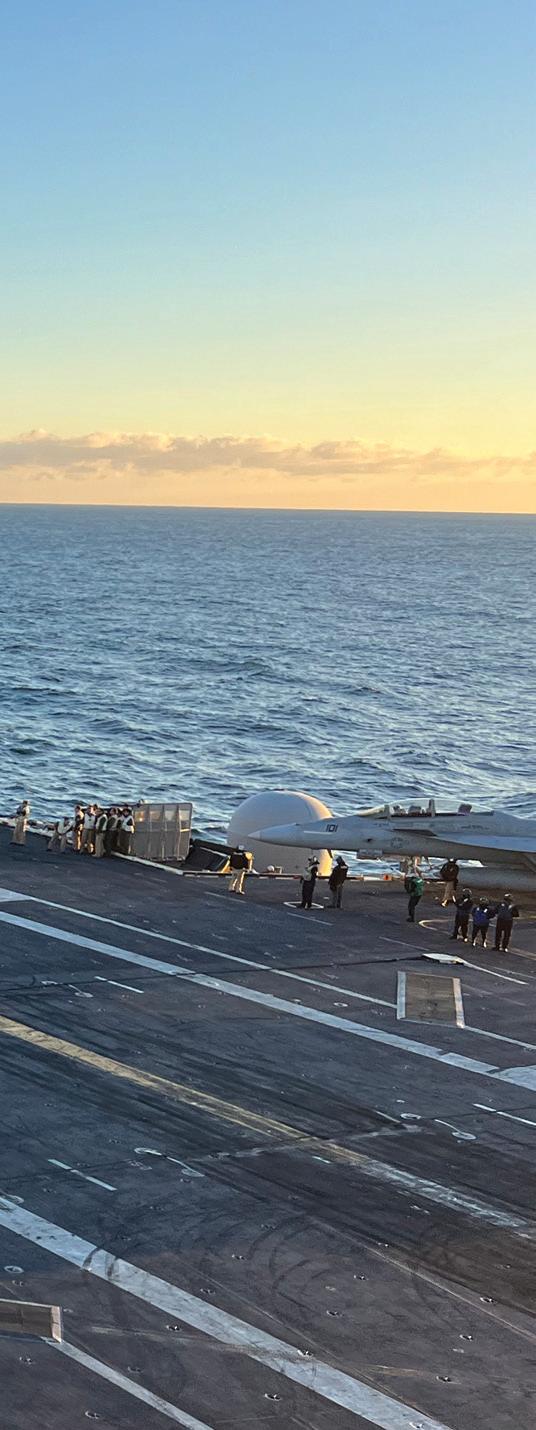
from 0 to 160 mph in a couple of hundred feet. A trail of steam billows out of the catapult track after takeoff.
Moving to the rear of the carrier, we watched planes come in for touch-and-go and arrested landings. The ship’s arresting gear discharges 1,100 feet of cable, which is caught by the tailhook of a landing plane, stopping the aircraft from a speed of about 150 mph in a few hundred feet.
Watching a plane whiz by as it catches the cable was a whole new level of impressive. Observing flight operations from the deck was exhilarating and sobering at the same time. The flight deck of an aircraft carrier has been called one of the most dangerous work environments in the

world. During our safety brief, the safety officer described it as, “very violent, very fast-paced operations. A lot of ‘g’s’ going on.” I was very conscious that I was a spectator to a high-risk activity.
We moved on to the high perch of Vultures Row, a viewing area behind the ship’s bridge, which offered a better perspective of the endless movement of planes on the deck, landing, fueling and transiting into position for a catapult shot. In the evening, we came back to Vulture’s Row for night operations. Watching jets land on a small, moving runway in the dark in the middle of the ocean was a nail-biter.
We were all ready for our bunks by 10 p.m. Since I was the only woman in our
Clockwise
personnel

serve breakfast, lunch, dinner and midrats, a midnight meal for sailors working the night shift. Hull Technician Davies gives a rundown on the work in the machine shop. “If it breaks, we can fix it. We have to be selfsufficient,” he said. The Officer of the Deck (OOD), the direct representative of the ship’s commanding officer, is responsible for the ship while on watch.


group, I got a cabin to myself. The room was comfortable, pretty chilly and noisy. Flights continued into the night, and I could hear the arresting cables whooshing out and the jet engines roaring. But I warmed up under four blankets and was lulled to sleep by the gentle rocking of the ship.
We were back up with the sun, touring a few more hours until we were scheduled to fly back to North Island on V-22 Ospreys, the tilt-rotor aircraft that flies vertically like helicopters or horizontally like prop-planes. Yes, I was very excited.

Outfitted again with safety gear and cranials, we boarded the Osprey at 10:30 a.m. for the hour flight back to North Island. A
few sailors joined us as they transported off the ship for leave time, change of duty or medical appointments. This was just another day for them, like riding a bus to work.
Making our final approach into North Island I could see the Hotel del Coronado and the Coronado Shores as we flew over North Beach. We landed by the terminal in the middle of North Island and the great adventure was over.
Even though it’s very likely that I was the oldest person on board, I’m happy to say that I easily climbed countless ladders and didn’t hit my head, crack my shins or trip over anything.
It was a day to remember. ■

Feb. 15, 1913
The Curtiss tractor biplane was unveiled at the Curtiss Aviation School on North Island. The new plane was said to be the heaviest successful American tractor plane. The body of the plane was completely enclosed and carried two people as in an automobile. It was designed for military use.
Feb. 3, 1923
Lifeguard Eugene Estoppey organized the Coronado Beach Boys’ Club with a starting enrollment of 20 members. Among the first to join was Frank Spreckels, grandson of John D. Spreckels. To join the club, a boy had to be able to run 50 yards, swim 50 yards and row a boat. The club planned scout work in preparation for the September convention of the Municipalities of California in Coronado. The goal was to show California that Coronado was the perfect place to raise boys.
Feb. 3, 1923
City trustees accepted a proposal made by the J. D. and A. B. Spreckels Security Co. to finance a new fire and police station at a cost of $23,000. The agreement included the city selling Spreckels the lot for $2,400 at 6th Street between Palm and Orange avenues. Upon completion by July 1, 1923, the city would lease the property for 10 years at an annual rate of one-tenth the cost of the building, along with

interest, and after 10 years, purchase it for $1. The new station was built in a Spanish-California style.
Feb. 10, 1923
Popular teacher Miss Port was leaving the Coronado School District to get married. Elizabeth Floyd, representing the Coronado High School student body, presented Port with an electric toaster, a rolling pin and a can opener as farewell gifts.
Feb. 14, 1933
Five Coronado members of the San Diego Racing Pigeon Club entered birds in the World’s Fair Convention Futurity Race, between Ames, Iowa and Chicago, a distance of 300 miles. Twenty birds were flown by Luther Kennett, Ernest Davy, W. Ball, B. N. Gladding and Charles Rink. It was estimated that at least 10,000 young pigeons competed in the World’s Fair race.

Feb. 25, 1943
Coronado residents stood in line at the high school to obtain War Ration Book No. 2, used to purchase canned vegetables, fruits, soups, frozen foods and several items of dried foods.
Feb. 5, 1953
The Board of Education purchased 11 lots in the new Country Club Estates Annex subdivision to build a school near 6th Street and Coronado Avenue.

Feb. 22, 1953
An estimated crowd of 40,000 came to see the recently reassembled Blue Angels perform at the Naval Air Station North Island. This was the precision flight team’s first appearance before the Southern California public. The new Blue Angels team made their first appearance June 18, 1952, at Naval Air Station Corpus Christi, Texas. Originally

organized in 1946, the group disbanded for Korean combat duty in July 1950.
Feb. 26, 1953
The final match of the local yo-yo contest was held. Winners were awarded medals, emblems and trophies. The match was a qualifier for the state and national yo-yo contests. National contestants competed for $17,500 in prizes.
Feb. 11, 1993
Calling affordable housing the “issue of the ’90s,” Assistant City Manager Pamela Willis said that Coronado’s Community Development Agency (CDA) could lose its funding if the city fails to meet state housing requirements. The state mandated that the city needed to make a clear effort to provide new affordable units and develop a longterm plan for meeting state requirements. ■
The pilots of the 1952 Blue Angels team depart their aircraft. U.S. NAVY / NATIONAL ARCHIVES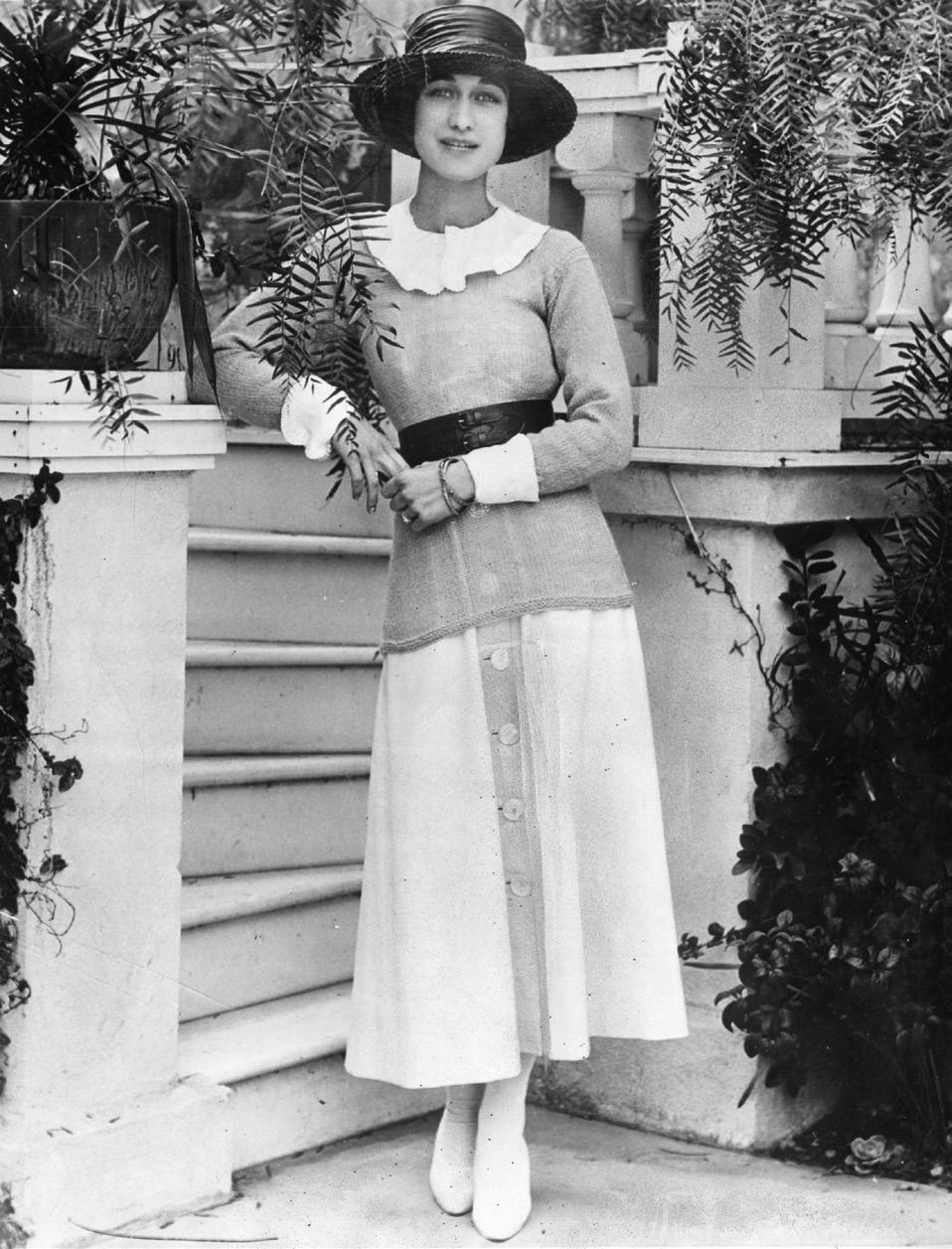

Lou Bigelow was never destined to be like other women. Born into a family of independent spirits and eccentrics, she was encouraged to pursue her interests without the usual pressure to marry and have children.
Born in St. Louis, Missouri, on Nov. 4, 1884, to Lyman and Ada Bigelow, Lou Bigelow was the oldest of three children, which included sister Ada and brother Herbert. Her father was a successful portrait photographer who trained his children in the photography business. Bigelow was a talented apprentice and loved everything about photography. She followed her father’s career path, which eventually led her to Coronado.
As a veteran of the Civil War, Lyman Bigelow was eligible to homestead land in Montana on what had been the Flathead Indian Reservation. He decided to start a new life out West around 1910. His two younger children were both married and stayed behind, but Bigelow went West with her parents. The family opened a photography studio in Ronan,
« Wallis Simpson was one of Lou Bigelow's most renowned clients. This photo is dated from 1928, one year after she divorced her first husband, Earl Spencer, a Navy pilot and the first commanding officer of the North Island Naval Air Station.
Montana. A rarity in the Wild West, the studio was very successful.
In 1912, Roland Reed visited the studio. Reed was renowned for his photographs of Native Americans, and he and the Bigelows became friends. When Reed needed help with large-format printing at his studio in Kalispell, Montana, he requested that Lou Bigelow become his assistant. Her father, knowing that Reed would further his daughter’s photography skills, consented to the arrangement.
Reed received a commission to photograph members of the Blackfoot tribe for the Panama-California Exposition in San Diego opening in 1915. His life-size prints were on display and for sale in the Indian Arts Building at the expo and were a big hit. To keep up with the printing demand, Reed opened a local photo studio, which he outfitted with high-end camera equipment. In March 1915, a few months after the exposition opened, Reed and Bigelow arrived in Coronado to begin work at the Roland Reed Studio at 1115 Orange Ave.
But Reed wanted to get back outside and return to Montana. In November 1915, Reed sold the studio including all its equipment to Bigelow for a small down payment. Bigelow had found her home and became an independent businesswoman. She named her studio the Lou Goodale Bigelow Studio, changing her middle name from Adelaide to Goodale, her father’s middle name.
Bigelow’s photos had an ethereal quality to them. She had talent for understanding lighting and capturing her subjects with a glowing softness without losing detail.

Within months, her reputation as a portrait photographer spread.
To help with the growing business, Bigelow’s parents moved to Coronado in 1917. She bought a house at 1038 B Ave., just steps behind the studio. Bigelow married Ben Krout in 1921. He was a friend from St. Louis with whom she had corresponded through the years and the two eloped in Golden, Colorado. Krout quit his job as a traveling salesman and moved to Coronado to help at the studio, allowing Bigelow’s father to retire. That same year, Bigelow’s niece, Nadine Tilley,
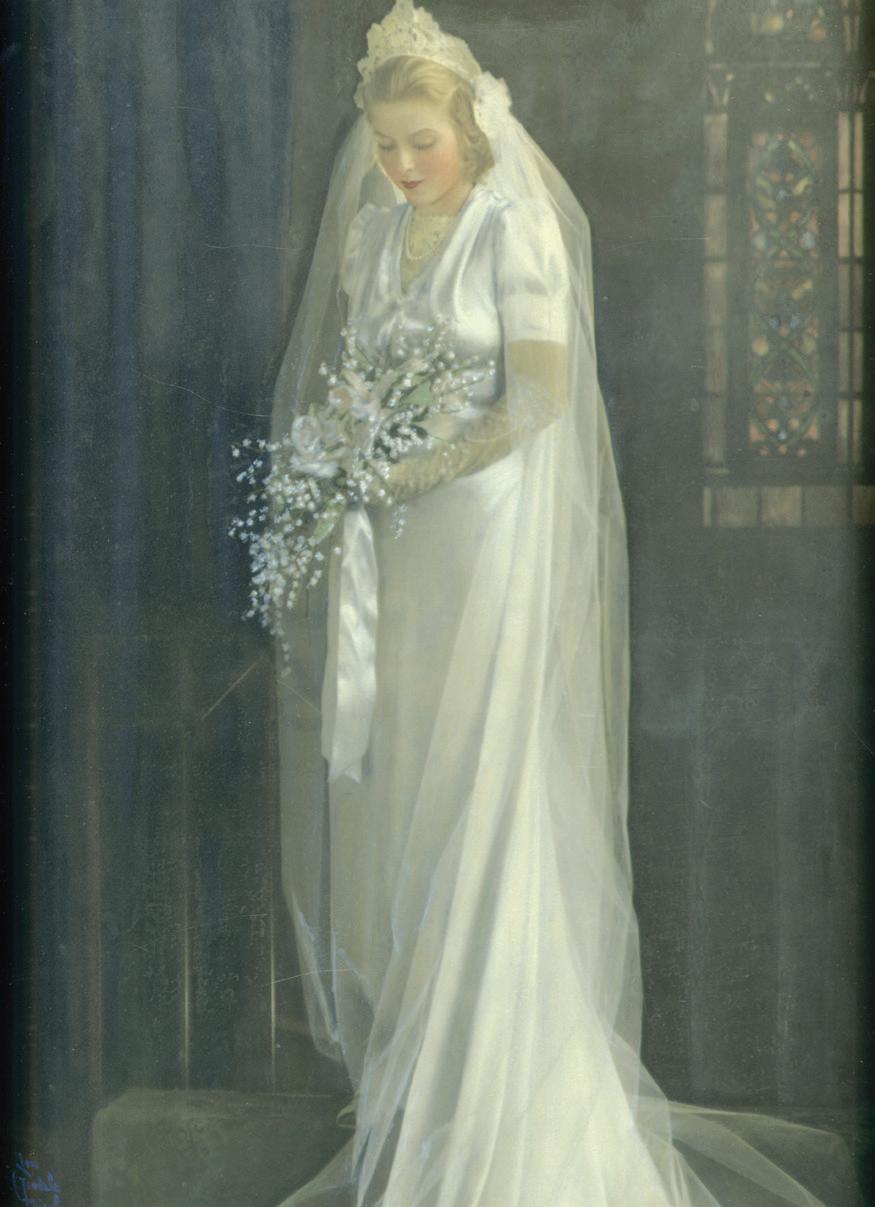
moved from Kansas to learn the photography business and work in the studio. Her parents, Ada and Oscar Tilley, followed a few years later.
One of Bigelow’s studio subjects was Wallis Spencer, whose husband became the first commanding officer of North Island in 1917. She visited Bigelow’s studio on several occasions while living in Coronado. Spencer later became known as the woman who caused England’s Prince Edward to abdicate the throne. She had divorced Spencer in 1921 and was married
to Ernest Simpson when she became involved with Prince Edward. He stepped down in 1936 to marry her.
Bigelow’s studio had a 16-by-20-inch print of Spencer hanging in the studio for many years, chosen as an example of a smart woman, beautifully posed.
Bigelow herself connected with independent women of her era. She became friends with Eileen Jackson, society columnist at the San Diego Union, and Cora Moreland, press agent for the Hotel del Coronado. Moreland and Jackson sent

work in Bigelow’s direction. In turn, Bigelow sent images to Moreland and Jackson who put the photos into news syndication. Bigelow wasn’t paid for the images she shared, but the arrangement helped bring a steady stream of rich and famous clients to her studio.
When the scandal with Prince Edward broke, Bigelow remembered the young navy wife and sent the print of Simpson to Jackson. The image was circulated internationally, giving Bigelow’s reputation a boost.
In an interview with the San Diego Union in 1936, Bigelow said of Simpson: “She is an attractive and fascinating woman. She is the most beautifully groomed woman I have seen with a pencil thin silhouette and infallible chic that made her a perfect model.”

Krout and Bigelow separated after 10 years of marriage largely due to Krout’s drinking problem. It’s unclear whether they divorced, but they remained close until his death in 1937. But even while they were together, Bigelow retained her last name.
Looking toward retirement, Bigelow, her sister and brother-in-law purchased a ranch and orange grove overlooking El Cajon in 1943. Oscar Tilley devoted his time to the ranch while the two sisters continued working at studio. In 1948, Bigelow decided it was time to retire. Jeannette Atkinson, who had worked at the studio for 10 years, took over the business.
Bigelow also sold her Coronado house when she retired. Years later, the house was saved from demolition and was moved to 234 Soledad Place, across from Coronado Hospital, where it still stands today.
Bigelow died in 1968. Though she left behind a legacy of work, a public portrait of the talented photographer does not exist. ■
The WENTLETRAP is creature with a narrow, delicate white shell. The shell has eight whorls of spirals with a purple tinge between the whorls and 12 ridges on each spiral. The shell gets its name from the Dutch word “wenteltrap,” which means spiral staircase. These small gastropods, which grow to about an inch long, live in intertidal waters along the West Coast from Baja California, Mexico to Alaska. During high tides, they feed on sea anemones by injecting them with a toxic purple dye that acts as an anesthetic. When they’re not feeding, they burrow into the sand as the tide recedes. Empty shells can be found in the wrack line where ocean detritus is deposited at high tide. ■
Class: Gastropoda
Order: Caenogastropoda
Family: Epitoniidae

Genus: Epitonium
Species: Tinctum

CORONADOBEACHCOMBER
Coronado’s shoreline changes with the weather, tides and time of year. Coronadobeachcomber explores our shores daily on the beach or at the bay, paying attention to the interesting animals, shells and sea life. Follow @coronadobeachcomber on Instagram.

ALBACA
Coronado Island
Marriott Resort & Spa
2000 2nd St.
(619) 435-3000
Amalo Brew Coffee
Coronado Public Library
640 Orange Ave.
(619) 537-9011
Avenue Liquor Wine & Subs
878 Orange Ave.
(619) 435-4663
Bluewater Grill
1701 Strand Way
(619) 435-0155
Boney’s Bayside Market
155 Orange Ave.
(619) 435-0776
The Brigantine
1333 Orange Ave.
(619) 435-4166
Burger King Ferry Landing
1201 1st St.
(619) 435-8707
Burger Lounge
922 Orange Ave.
(619) 435-6835
Calypso Cafe
505 Grand Caribe Causeway
(619) 423-5144
Central Liquor & Deli
178 Orange Ave.
(619) 435-0118
Chez Loma
1132 Loma Ave.
(619) 435-0661
Chipotle
1360 Orange Ave.
(619) 435-7778
Clayton’s Bakery and Bistro
849 Orange Ave.
(619) 319-5001
Clayton’s Coffee Shop
979 Orange Ave.
(619) 435-5425
Clayton’s Mexican Takeout
1107 10th St.
(619) 437-8811
Cold Stone Creamery
Ferry Landing
1201 1st St.
(619) 437-6919
Coronado Brewing Co.
170 Orange Ave.
(619) 437-4452
Coronado Coffee Co.
Ferry Landing
1201 1st St.
(619) 522-0217
Coronado Tasting Room
Ferry Landing
1201 1st St. #101 (619) 534-5034
Costa Azul
Ferry Landing
1201 1st St. (619) 435-3525
Crown Bistro

Crown City Inn
520 Orange Ave. (619) 435-3678
Crown Landing
Loews Coronado Bay Resort
4000 Coronado Bay Road
(619) 424-4000
Crown Town Deli
Ferry Landing
1201 1st St.
(619) 675-0013
Danny’s Palm Bar & Grill
965 Orange Ave.
(619) 435-3171
Domino’s Pizza
1330 Orange Ave.
(619) 437-4241
Feast & Fareway
Coronado Golf Course
2000 Visalia Row
(619) 996-3322
Garage Buona Forchetta
1000 C Ave.
(619) 675-0079
Gelato Paradiso
918 Orange Ave.
(619) 629-5343
High Tide Bottle Shop & Kitchen
933 Orange Ave.
(619) 435-1380
Hotel del Coronado
1500 Ocean Blvd.
• Babcock & Story Bar
(619) 435-6611
• Eno Pizzeria
(619) 522-8546
• Serea Coastal Cuisine
(619) 435-6611
• Sheerwater
(619) 522-8490
• Sundeck
(619) 522-8039
• Beach Taco & Shack
• Sundae's Ice Cream & Gelateria
Il Fornaio
1333 1st St.
(619) 437-4911
Island Pasta
1202 Orange Ave.
(619) 435-4545
KFC/Taco Bell
100 B Ave.
(619) 435-2055
Lil’ Piggy’s Bar-B-Q
Ferry Landing
1201 1st St.
(619) 522-0217
Little Club
132 Orange Ave.
(619) 435-5885
Little Frenchie
1166 Orange Ave.
(619) 675-0041
Lobster West
1033 B Ave. #102
(619) 675-0002
McP's Irish Pub
1107 Orange Ave.
(619) 435-5280
Miguel’s Cocina
1351 Orange Ave.
(619) 437-4237
Mindful Cafe
Sharp Coronado Hospital
250 Prospect Ave.
(619) 522-3600
MooTime Creamery
1025 Orange Ave.
(619) 435-2422
Nado Gelato Cafe
1017 C Ave.
(619) 522-9053
Nado Republic
1007 C Ave.
(619) 996-3271
Nicky Rottens Bar & Burger Joint
100 Orange Ave.
(619) 537-0280
Night & Day Cafe
847 Orange Ave.
(619) 435-9776
Panera
980 Orange Ave.
(619) 437-4288
Parakeet Cafe
1134 Orange Avenue
(619) 675-0104
Parakeet Juicery West
1138 Orange Ave.
(619) 537-0018
Parakeet Juicery East
943 Orange Avenue
(619) 319-5931
Park Place Liquor & Deli
1000 Park Place
(619) 435-0116
Poke123
1009 Orange Ave.
(571) 221-4649
Rosemary Trattoria
120 Orange Ave.
(619) 537-0054
Saiko Sushi
116 Orange Ave.
(619) 435-0868
Serrano
126 Orange Ave.
(619) 319-5955
Spiro’s Greek Cafe

Ferry Landing
1201 1st St.
(619) 435-1225
Starbucks
960 Orange Ave.
(619) 437-8306
Stake Chophouse & Bar
1309 Orange Ave.
(619) 522-0077
Subway
1330 Orange Ave.
(619) 435-8272
Swaddee Thai
1001 C Ave.
(619) 435-8110
Tartine
1106 1st St.
(619) 435-4323
Tavern
1310 Orange Ave. (619) 437-0611
Tent City
1100 Orange Ave. (619) 435-4611
The Henry 1031 Orange Ave. (619) 762-1022
The Islander
1015 Orange Ave. (619) 437-6087
Trident Coffee
942 Orange Ave. (619) 509-7118
Villa Nueva Bakery Café 956 Orange Ave. (619) 435-1256
Village Pizzeria
1206 Orange Ave. (619) 522-0449
Village Pizzeria Bayside
Ferry Landing
1201 1st St. (619) 437-0650
Which Wich
926 Orange Ave. (619) 522-9424
Wine a Bit
928 Orange Ave. (619) 365-4953
Yummy Sushi
1330 Orange Ave. (619) 435-2771

With spring just around the corner, February is a fabulous time to spruce up your yard. Don’t be afraid to make changes — maybe just a tweak, or perhaps, installing an entirely new design feature. It could catch the eye of the Home Front judges for the Coronado Flower Show, scheduled April 1516.
Here are 10 ideas to add a fresh spark to your garden.
1. GET OUT OF LINE. Straight lines belong on ruled note pads, not in your garden. Many gardeners plant in straight lines mimicking soldiers in formation, especially when adding seasonal annuals to their landscape. Strive for a more naturalistic look. Plant annuals in several small drifts or masses; repetition is an important principle of landscape design.
« When adding spring flowers, arrange the plants in clusters instead of straight lines. DAVID PRAHL | DREAMSTIME

2. STEAL FROM YOUR NEIGHBORS (inspiration, not items). During neighborhood walks, keep your eyes open for plants thriving in nearby gardens. Chances are they’ll do well in your yard, too. Be mindful of sun exposure, though. That enticing fuchsia growing in your neighbor’s shady side yard will not do well in your sunny, south-facing perennial bed. Not sure of the name of your neighbor’s plant you’re coveting? Take a gander at tip No. 3.
3. MEET YOUR (PLANT) NEIGHBORS. If you never learned the names of the plant life that surrounds you, download a plant identification app on your phone. There are many plant ID apps available. PictureThis, PlantNet and iNaturalist are three of the most popular. These apps are a terrific way to photograph, identify and document your plant wish list. They are also more than just a little addictive.

4. FLIP YOUR FRONT YARD. Many front yard landscapes are laid out from the perspective of the sidewalk with ornamental shrubs and flowers hugging a house’s foundation. This gives passersby a visual treat, but residents get a view of nothing except an expanse of grass from inside the house. If this is the case with your front yard, consider adding a swath of perennials and shrubs close to the sidewalk to brighten the view from the interior of your home.
5. SAY ADIOS TO YOUR LAWN. If the most action your lawn sees is the weekly visit from your gardener, it’s time
to remove that patch of grass, which consumes time, money, fertilizer and water. But don’t fall prey to artificial turf. It increases the heat level, ruins the soil’s ecosystem, and — despite what the turf salesperson says — looks like plastic carpet. (Would you add plastic trees and flowers to your yard? Probably not.)
Consider a combination of low-water herbaceous plants, mulch and permeable ground cover such as decomposed granite to create a low-maintenance space that benefits the natural ecosystem. For best results, consult with a landscape architect.
6. VEGGIES IN THE FRONT YARD? Why not? Now that you’re removing turf from your front yard, how about adding veggies? Fritz Haeg, author of “Edible Estates: Attack on the Front Lawn,” advocates removing conventional front landscaping and planting edibles. Haeg calls his approach “full-frontal gardening.” Besides being a smart use of space, it’s a great way to meet your neighbors while tending your crops. Consider using a galvanized metal stock tank, or a cattle trough, as a raised garden bed. These troughs add visual interest, are relatively inexpensive, come in a variety of sizes and won’t rot in a few years like wooden containers. I use two metal tanks for veggie gardening and love them.
7. LEARN ALL ABOUT THE BIRDS AND THE BEES (and the butterflies). Choose plants with pollinators in mind. Bees, butterflies, moths and hummingbirds are instrumental in providing pollination services while contributing to
A vegetable garden in the front yard is a practical use of space and can be decorative.

the richness of local biodiversity. When shopping for flowering plants, remember the adage, “Hummingbirds like ice cream cones; butterflies like pizza.” Tubular-shaped flowers (trumpet vine, salvias) will attract hummingbirds; flat flowers (yarrow, sunflowers) attract butterflies. For details on attracting pollinators to your garden, check out the UC Agriculture and Natural Resources website anrcatalog.ucanr.edu/pdf/8498.pdf.

8. DON’T BUY A DOBERMAN WHEN THERE’S ONLY ROOM FOR A DACHSHUND. Do your research and read the labels on plant containers. If you only have a space for a 2-foot-by-3foot plant, choose a variety that remains small. Otherwise, you’ll be hacking, and eventually hating, that plant on a regular
basis. Sounds elementary, but so many gardeners are swayed by nursery impulse buys — I’m guilty! — then after a year, realize their Doberman of a plant is taking over their petite plot.
9. SHOP AT LOCAL NURSERIES. Though big-box stores can sometimes save you money, the advice you can get from trained nursery employees is invaluable. Local nurseries are also excellent resources for native plants, special orders and free horticulture seminars.
10. ASK FOR HELP. When in doubt, call the San Diego Master Gardener hotline (858) 822-6910 or email help@ mastergardenersd.org. ■


